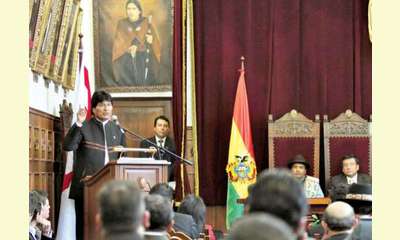|
|
Evo asks the judiciary to make the people aware of its reforms [Bolivia]
un article par Opinión, Bolivia
President Evo Morales affirmed Friday that the most important task of the judiciary is that the Bolivian people should feel the reforms in administration of justice that has begun with the election of judges by popular vote. In his opinion, there needs to be a real effort to further strengthen these changes.

President Evo Morales with high judicial authorities at the inauguration of the new administration in Sucre
click on photo to enlarge
The head of state attended the inauguration of the judicial year at a ceremony in Sucre. In his speech he pleaded that the reforms, which began with the election of judges who wear ponchos and sandals, should lead to the elimination of the injustice and corruption that has too long accompanied the privileges of judges.
The new judiciary celebrates the first anniversary of its shake-up, the greatest crisis in the history of the country's judicial system. The challenge is to purge those judges, magistrates and prosecutors accused of corruption, extortion and delay of justice.
"The most important task is not how the reforms appear, but how they are experienced by the people of Bolivia. That is the huge responsibility we have for now," said the president.
Morales lamented that corrupt professionals are causing slowdown and extortion in a practice inherited from neoliberalism. "If the law truly had dignity, it would never defend drug traffickers, but would advocate recovery," he reflected.
The Chief Justice, Gonzalo Hurtado, cited on Friday the progress of reforms in the judicial system and said that they constitute a "fundamental milestone" in the State Constitution adopted by popular referendum on January 25, 2009 ".
Hurtado's words were spoken during the opening ceremony of the judicial year 2013, which follows the election of judicial authorities last year, and in which, according to him, one of the main achievements was "legal pluralism which which has introduced indigenous peasant jurisdiction."
In this regard, the judge also noted that Act 025, adopted on June 24, 2010, "is another step in the path of judicial reform", saying that this instrument "develops the structure, organization and operation of the judiciary" incorporating "the culture of peace as a peaceful way to resolve legal disputes. "
Regarding the resolution of cases in different courtrooms, Hurtado said the specialized chambers of the Court resolved a total of 1,863 cases, while the chambers for dispute settlements resolved 1247 cases,making a total of 3,110 cases resolved under his management.
Hurtado also noted that the provision of new codes is a "central task" and will become one of "the central pillars of the transformation of justice." He therefore called on the Ministry of Justice "to deliver immediately" draft laws for civil, criminal and social codes to the legislature for approval.
(Click here for a Spanish version of this article)
|








|
DISCUSSION
Question(s) liée(s) à cet article:
Restorative justice, What does it look like in practice?
* * * * *
Commentaire le plus récent:
On this theme, I encourage CPNN readers to read Restorative Justice for Children in Brazil.

|
|









